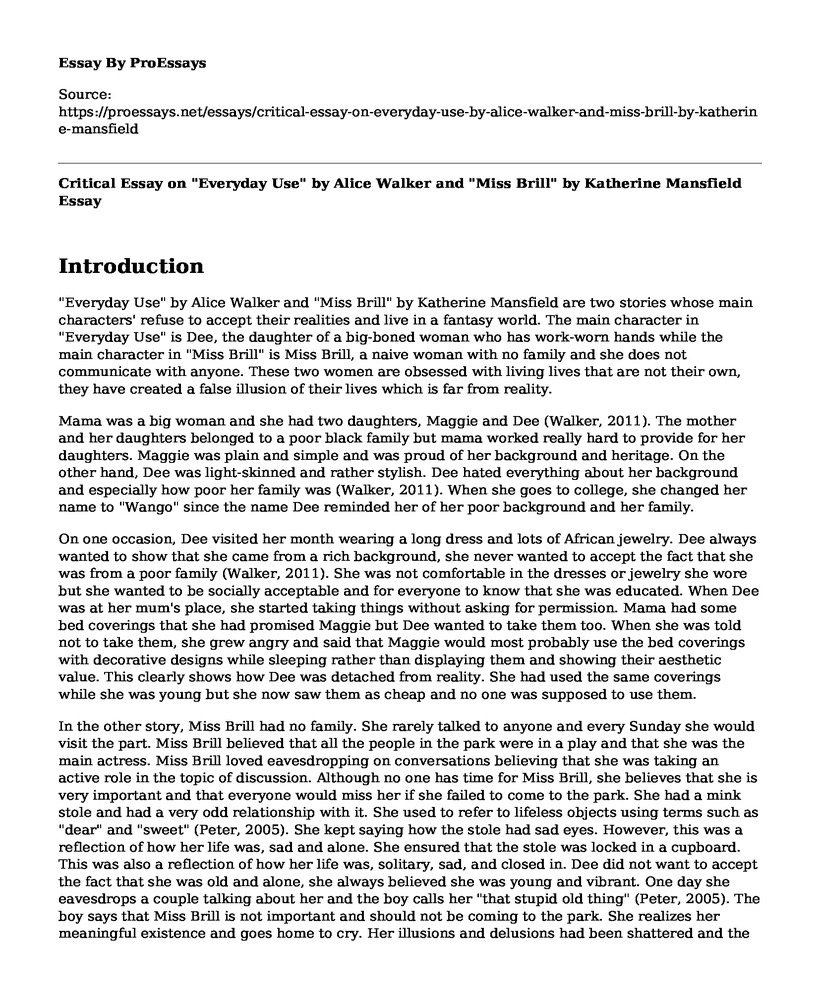Introduction
"Everyday Use" by Alice Walker and "Miss Brill" by Katherine Mansfield are two stories whose main characters' refuse to accept their realities and live in a fantasy world. The main character in "Everyday Use" is Dee, the daughter of a big-boned woman who has work-worn hands while the main character in "Miss Brill" is Miss Brill, a naive woman with no family and she does not communicate with anyone. These two women are obsessed with living lives that are not their own, they have created a false illusion of their lives which is far from reality.
Mama was a big woman and she had two daughters, Maggie and Dee (Walker, 2011). The mother and her daughters belonged to a poor black family but mama worked really hard to provide for her daughters. Maggie was plain and simple and was proud of her background and heritage. On the other hand, Dee was light-skinned and rather stylish. Dee hated everything about her background and especially how poor her family was (Walker, 2011). When she goes to college, she changed her name to "Wango" since the name Dee reminded her of her poor background and her family.
On one occasion, Dee visited her month wearing a long dress and lots of African jewelry. Dee always wanted to show that she came from a rich background, she never wanted to accept the fact that she was from a poor family (Walker, 2011). She was not comfortable in the dresses or jewelry she wore but she wanted to be socially acceptable and for everyone to know that she was educated. When Dee was at her mum's place, she started taking things without asking for permission. Mama had some bed coverings that she had promised Maggie but Dee wanted to take them too. When she was told not to take them, she grew angry and said that Maggie would most probably use the bed coverings with decorative designs while sleeping rather than displaying them and showing their aesthetic value. This clearly shows how Dee was detached from reality. She had used the same coverings while she was young but she now saw them as cheap and no one was supposed to use them.
In the other story, Miss Brill had no family. She rarely talked to anyone and every Sunday she would visit the part. Miss Brill believed that all the people in the park were in a play and that she was the main actress. Miss Brill loved eavesdropping on conversations believing that she was taking an active role in the topic of discussion. Although no one has time for Miss Brill, she believes that she is very important and that everyone would miss her if she failed to come to the park. She had a mink stole and had a very odd relationship with it. She used to refer to lifeless objects using terms such as "dear" and "sweet" (Peter, 2005). She kept saying how the stole had sad eyes. However, this was a reflection of how her life was, sad and alone. She ensured that the stole was locked in a cupboard. This was also a reflection of how her life was, solitary, sad, and closed in. Dee did not want to accept the fact that she was old and alone, she always believed she was young and vibrant. One day she eavesdrops a couple talking about her and the boy calls her "that stupid old thing" (Peter, 2005). The boy says that Miss Brill is not important and should not be coming to the park. She realizes her meaningful existence and goes home to cry. Her illusions and delusions had been shattered and the reality is that no one was concerned about her.
Conclusion
The manner in which Dee treated her mum and Maggie shows how much Dee is in her fantasy world. She would rather hurt her mum and talk badly about everything in their home as long as it does not seem socially acceptable. She does not want to accommodate the needs of Maggie and her mum and does not want to be associated with them since, according to her, they are backward. On the other hand, Miss Brill was in a fantasy world. She was old and alone and yet she thought and believed that she was an actress, young, beautiful, and aspiring. The main lesson in these two stories is that people should accept and face their realities rather than live in a fantasy world. Living in an illusion and fantasy world only creates a temporary and fragile happiness that can be easily shattered.
References
Peter Thorpe (2005). "Teaching Miss Brill". College English.com. 23 (8): 661-663.
Walker, Alice. (2011). "Everyday Use." The Story and Its Writer. Ed. Anna Charters. Compact 8th edition. Boston: Bedford/St. Martin's, 852-858.
Cite this page
Critical Essay on "Everyday Use" by Alice Walker and "Miss Brill" by Katherine Mansfield. (2022, Aug 10). Retrieved from https://proessays.net/essays/critical-essay-on-everyday-use-by-alice-walker-and-miss-brill-by-katherine-mansfield
If you are the original author of this essay and no longer wish to have it published on the ProEssays website, please click below to request its removal:
- Tom Jones Novel Essay
- Book Analysis Essay on the Kingdom of Matthias: A Story of Sex and Salvation
- Essay Sample on Hemingway: A New Value System for Surviving Disasters
- Essay Example on the Importance of Choice in The Giver
- Myths, Supernatural Powers, and Cultural Parallels: Ancient Sumerians and Greeks - Essay Sample
- Essay Sample on Katniss Everdeen: The Surprising Female Warrior of 'The Hunger Games'
- Book Review Sample on Revenge of Montresor: Edgar Poe's "The Cask of Amontillado"







